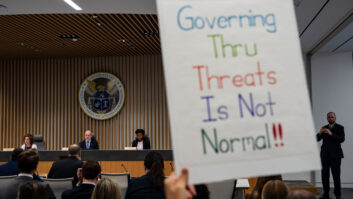The FCC says it will require a $416.1 million budget in fiscal 2026 to conduct its operations. That would be a 6.6% increase from its FY2025 budget request if approved by Congress. The new fiscal year begins Oct. 1.
This is the first budget request submitted under the leadership of Chairman Brendan Carr. Unsurprisingly the proposal includes cuts in the number of full-time employees compared to the 2025 request.
The request coincides with the release of the Trump administration’s 2026 discretionary budget proposal.
“In creating a lean, accountable and efficient commission that works for the American people, the commission requests 1,404 Full Time Equivalents (FTEs),” the FCC said. That is a decrease of 74 FTEs compared to the FY2025 proposal.
For comparison, the FCC’s FY2024 proposal included funding for 1,523 FTEs.

The FCC said it anticipates a “continued reduction in its workforce through planned and early retirements, participation by employees in the deferred resignation program that will leave at the end of FY 2025, and other attrition.”
“The FCC is well-positioned to continue carrying out its statutory mission with current and remaining staffing levels,” it said in its proposal.
As for specific bureaus, the FCC proposes 112 FTEs for its Media Bureau, which oversees radio and television broadcasters. Its estimate to Congress includes a request for $28.8 million to operate the bureau. Meanwhile, the Enforcement Bureau would be staffed with 174 employees and a budget of $46 million if the FY2026 request is approved.
The FCC said the 6.6% budget increase is attributable to its obligations under the Broadband DATA Act. The act, signed into law in 2020, directed the FCC to improve the ways it collects, verifies and reports broadband availability data, so that the FCC, other federal agencies, state, local and tribal governments have a precise and accurate view of where broadband is, and is not, available across the states and territories.
Congress appropriated $98 million in funding in December 2020 to cover the FCC’s implementation costs for the act. However, those dedicated funds were exhausted in April 2025. Going forward, funding to fulfill its mapping obligations will be funded as part of the FCC’s annual operating budget.
The 68-page bill outlines the FCC’s spending plan and priorities. The commission said the proposal would be used to advance four strategic goals: promoting high-speed internet, enhancing national security and public safety, protecting consumers and enhancing efficiency and reducing waste.
The FCC also is proposing $132 million in funding for its Spectrum Auction Program, a 3% decrease in funding from FY2025.
The FCC’s auction authority lapsed in March of 2023, as we have reported. The FCC said it needs Congress to restore its auction authority to harness the “promise of new wireless technologies and to free up unused and underutilized spectrum to serve as a catalyst for innovation and growth.”
As of FY2024 end, the spectrum auctions program, which allocates federally-owned spectrum to commercial bidders, has generated more than $233.5 billion for government use, according to the FCC.
The commission funds its operations through regulatory fee collections. It is estimated to collect $402.6 million in fees for FY2026. The FCC’s Office of Inspector General asks for another $13.5 million to perform the duties of the office.







